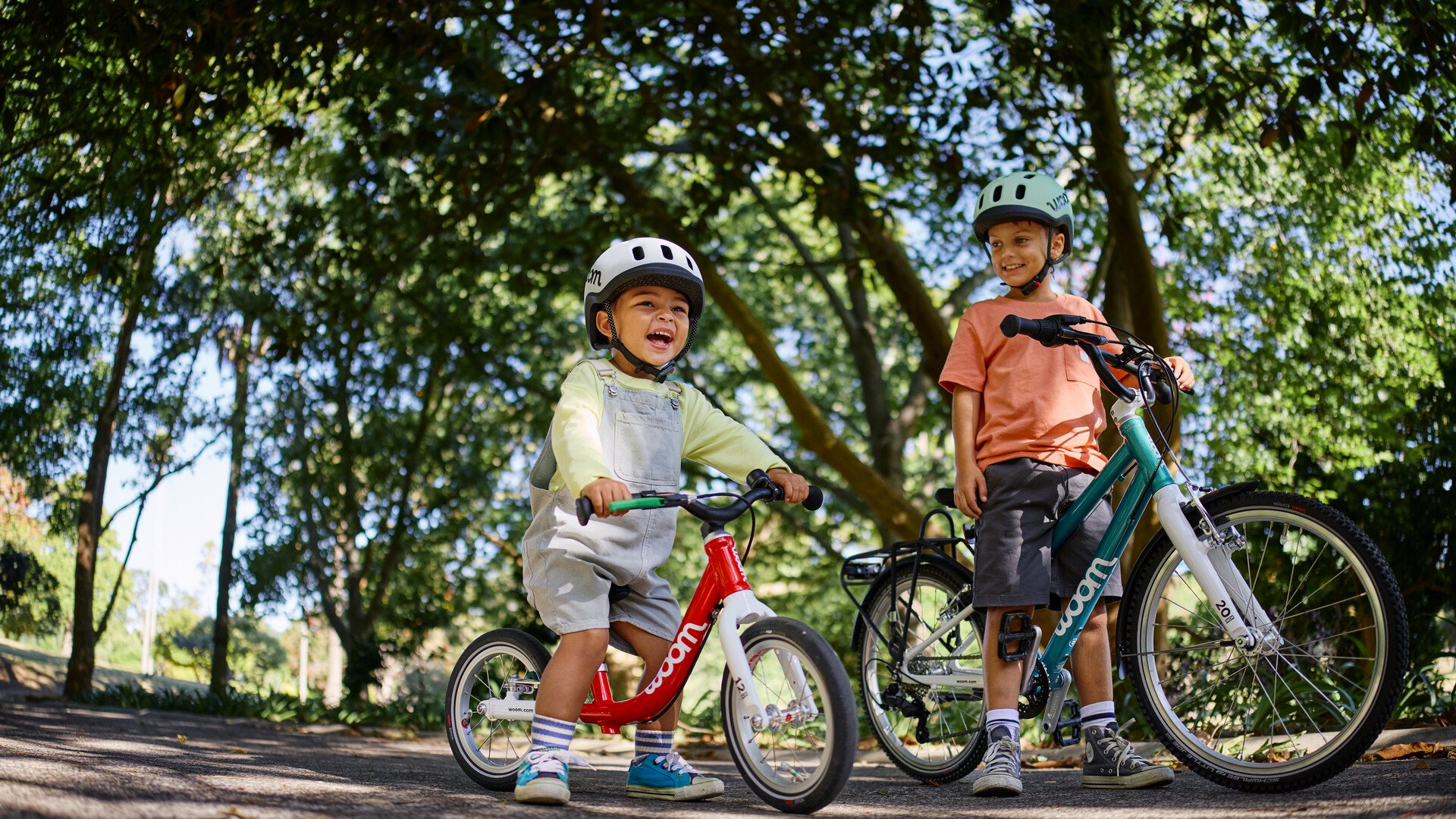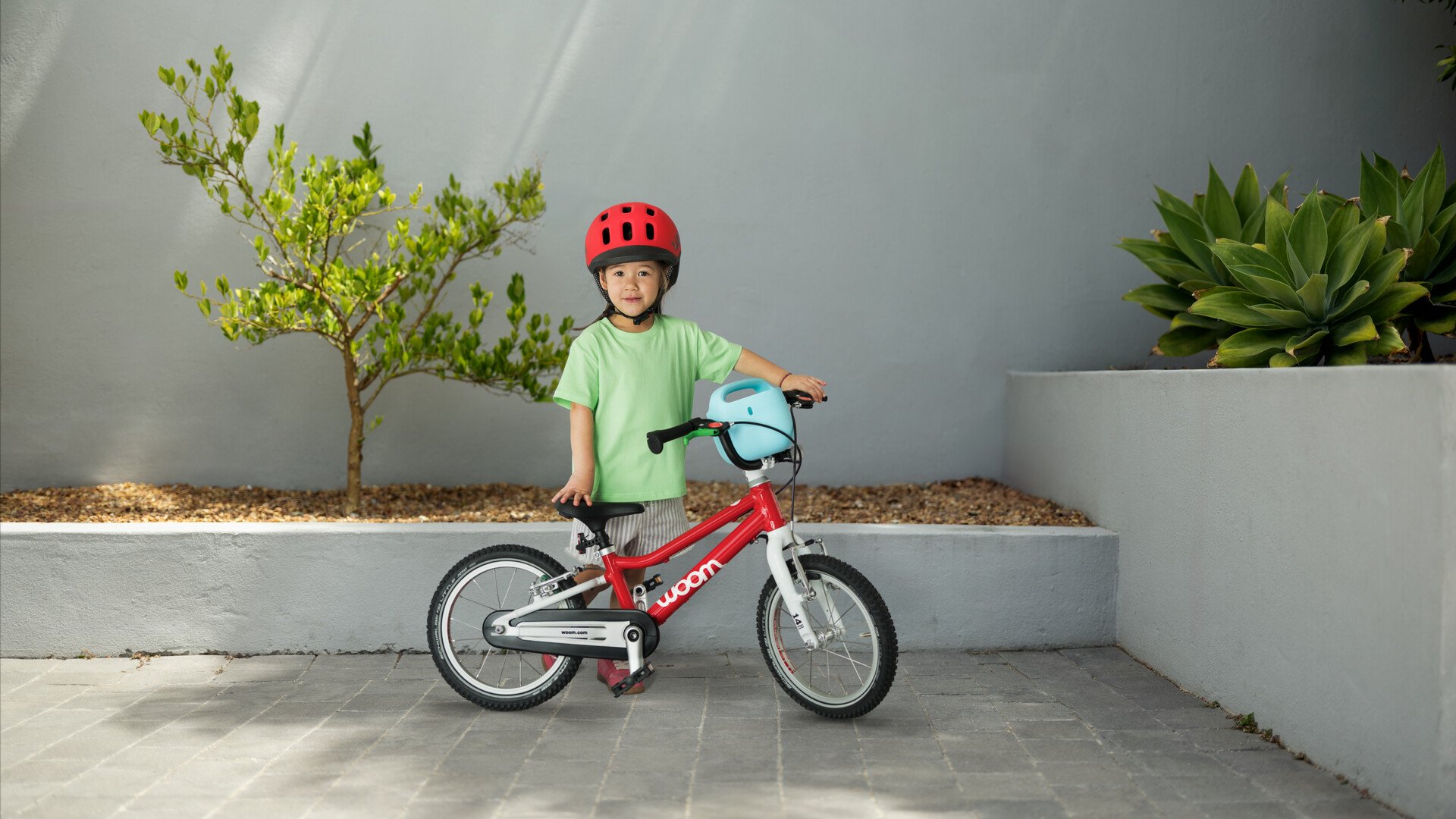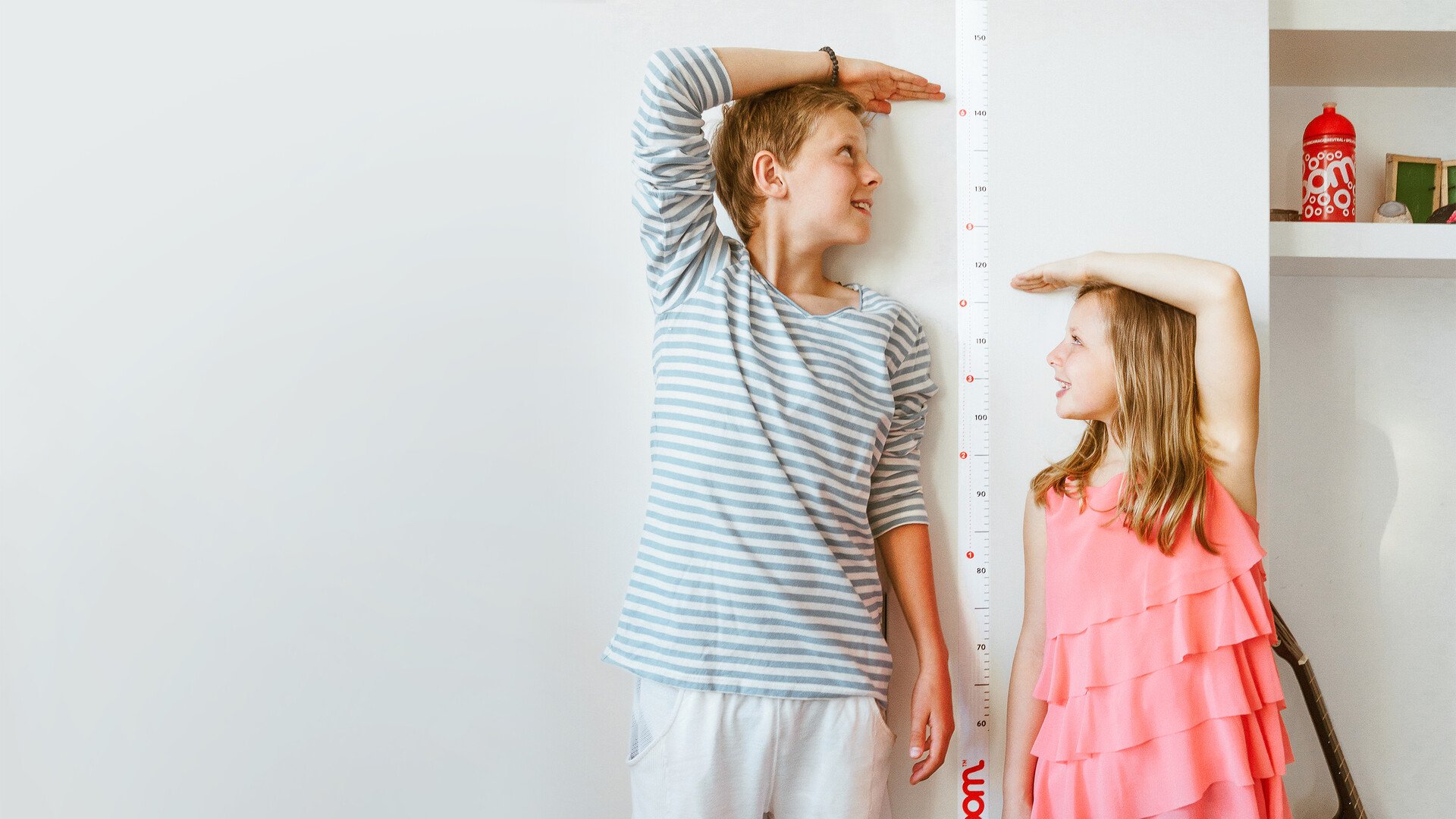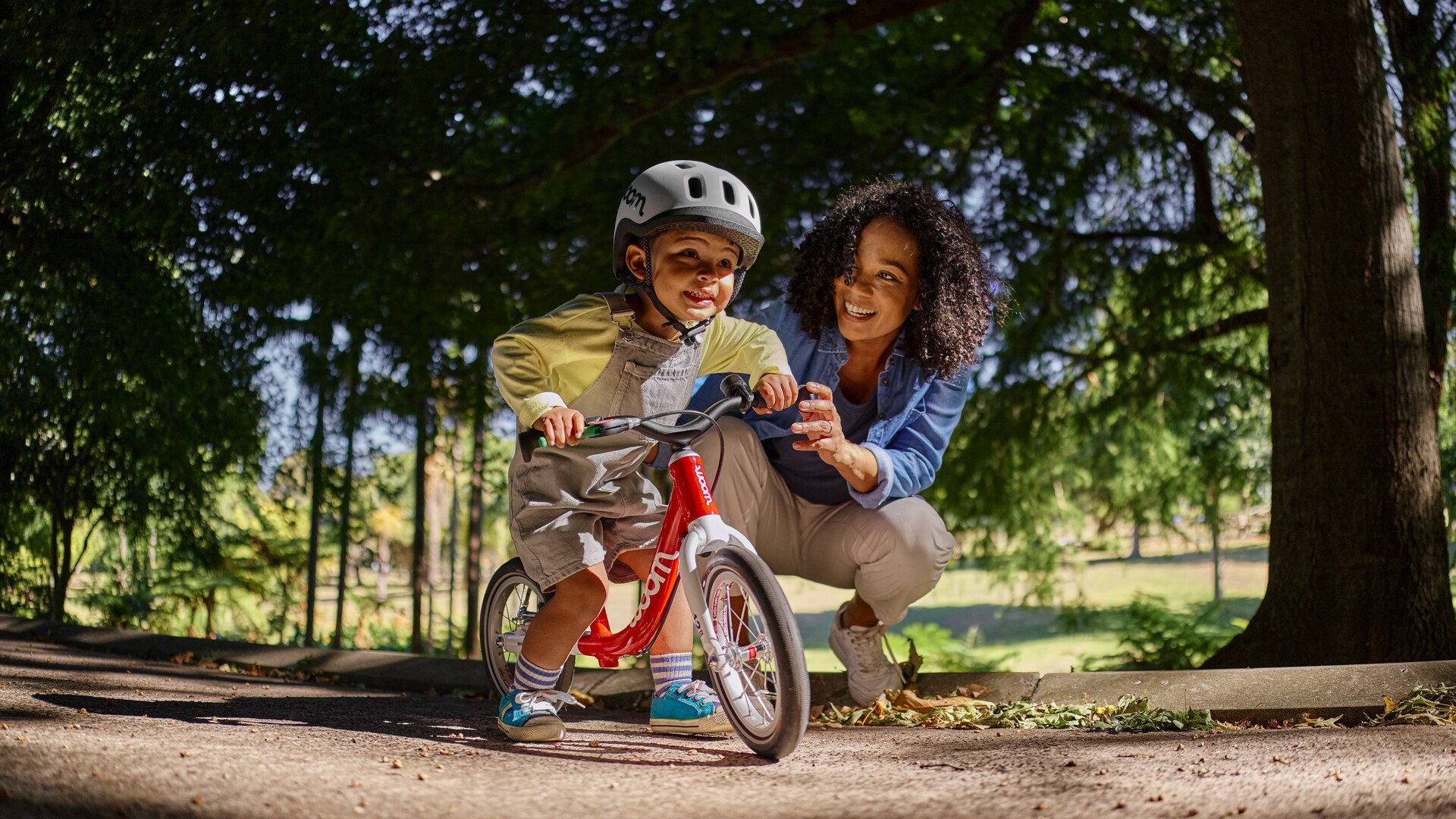What is the right-sized bike for my child?
Our bike finder helps you find the right-sized bike for your child — it's easier than you think.


There's a lot to think about when buying a kids' bike. We have the answers to questions like this...
... My child is between two sizes. Is it still worth getting the smaller one?
... Does my child need a balance bike or can they go straight to one with pedals?
... Can my child skip a size?
You'll find all the information you need on key topics like weight, safety, product quality, brakes and ergonomics in our helpful article >>"Buying a bike: the must knows".
What exactly do we mean by the 'right' size? Easy: For every child, there's a perfectly fitting bike out there. Just make sure you avoid the temptation to size up so that your child can grow into their bike. However minor those extra centimeters might seem, they can be the difference between frustration and fun with a children's bike.
For a bike to be the right size, your child should comfortably be able to reach the ground with both feet when the saddle is at its lowest without having to make any major adjustments to their posture.
Having immediate contact with the ground on both sides of the bike is extremely important so that the rider can handle their bike safely, especially for beginners or inexperienced riders.
Make sure that there's a visible gap between the top of your child's legs and the top tube when they're stood over the bike, straddling it with their feet on the ground – this is to ensure that their crotch won't hit the top tube in the event of a sudden dismount.
Whenever possible, arrange a test ride for the bike you're considering for your child. You should be able to determine quite quickly whether your child is capable of riding a bike of that size and feels secure in the saddle. In the best-case scenario, they'll hop on and take off!
If an in-person test ride is not a feasible option, you can order the woom bike of your choice from our online shop with free delivery and no obligations. You've then got 30 days to test the bike, before returning it or exchanging it if the size isn't right – the return postage is on us too. Use our online bike finder to work out which woom bike size is best for your child.
Don't be fooled by its deceptively simple-looking approach – our bike finder is backed by an exhaustively developed sizing system, which we derived from an enormous body of statistical data on child anatomies and now forms the basis for all woom bikes. This means that our bike finder really is the best (digital) way to find the right woom bike size for your child.
If you want to discover the ins and outs of the ingenious sizing system for our woom bikes, why adjustable components are so valuable on a kids' bike, and the safety benefits of having a perfectly sized bike, check out this article from our mini series.
Ready to find the right bike size for your child? Load up our bike finder and enter your child's age. Next, think about how tall your child is in relation to their peers. Would you say they're small, average or tall? If you're not sure, have a look at your child's medical records or refer to an online height calculator.
And what about your child's cycling experience? Think about their skills and confidence on a bike. Would you class them as a bike beginner or are they an advanced rider? Once you've entered all the information, the bike finder will suggest an appropriate woom bike and a specific size to suit your child.
It may be helpful to know that your child's riding ability is more important than their leg length when it comes to finding the right bike size. A child with well-developed motor skills will do just fine on a slightly larger bike, while a child of the same size with less experience and less confidence would struggle on that same bike. The leg length of children in the same age group doesn't vary all that much anyway. And it's hard to be spot on when taking inside leg measurements, so they can often be out by a good few centimeters.
That's exactly why we've deliberately avoided specifying a leg length in our product descriptions. We're confident that our bike finder is the best tool for finding the right bike size.
However, if you're still concerned about the inside leg measurement despite our assurances, you can download the overview below showing the inseam lengths that we consider minimum values for our bikes.
It's entirely possible that your one-and-a-half or two-and-a-half year old is still not registering an interest in a balance bike, and that's totally fine. All children are different and should make their own decisions about when is the right time to start riding a bike.
In any case, your child should learn how to ride a balance bike first because it teaches the balance that's so important in bike riding, and it will help your child gradually get the hang of using the hand brake to stop the bike. Find out exactly why balance biking is so beneficial for your child's development >>in this article.
For children whose interest in a balance bike develops later, we have designed the woom GO 1 PLUS, which comes with 14″ wheels instead of the 12″ wheels found on our standard balance bike, the woom GO 1.
As these kids tend to master their balance bike relatively quickly, the woom GO 1 PLUS comes with our SURFBOARD footrest fitted as standard. Once riders get the hang of keeping their balance and start to pick up speed and confidence, they can lift their feet up onto the footrest and enjoy the feeling of coasting along.
The most common question that we get asked about bike size is where to begin. What's the right size for your child's first bike: a woom GO 2 with 14″ wheels or a woom GO 3 with 16″ wheels?
The general rule of not buying an over-sized bike for your child to grow into is especially true when it comes to the first bike. Even if your child can confidently whiz around the neighborhood on a balance bike, the transition to a bike with pedals involves learning how to pedal, while simultaneously maintaining balance, steering, braking and cornering.
This sense of security is often lacking on a bike that's too big – picture a scene where your child is struggling to reach the ground with both feet. When using our bike finder, be aware that kids who are in the process of transitioning from a balance bike to a pedal bike are still considered as a beginner, even though your child may be able to pilot a balance bike like a pro.
So your child is already confidently riding a woom GO 2, woom GO 3 or woom GO 4 and you're wondering whether they could just skip a size? Organizing a test ride or making use of our bike finder will help you answer this question too.
As a general rule, though, we would advise against skipping a size. It can represent a bigger leap than you realize – particularly when you take into account that all our bikes from the woom GO 4 and up come with gearing which adds another dimension for your child.
For kids who are really confident on two wheels and can reach the ground on tiptoes even on the next size up, keep in mind that they won't just be riding a bigger frame but also maneuvering more weight. In short, the smaller-sized bike will be easier for your child to handle – especially if there's a situation where they've got to react at speed.
We've put a huge amount of time and energy into our sizing system. It's designed to ensure that your child is riding a bike that fits them perfectly across the ages. Our progressive system tracks your child's development as a rider, and skipping sizes breaks this progression.
Our woom GO 4 and woom EXPLORE 4 to 6 bikes are specced with our adjustable stem, which lets the bike grow by adjusting the height and length of the bars. These bikes are designed to last your child a really long time, ensuring that they're always able to find the optimal riding position as they get taller.





